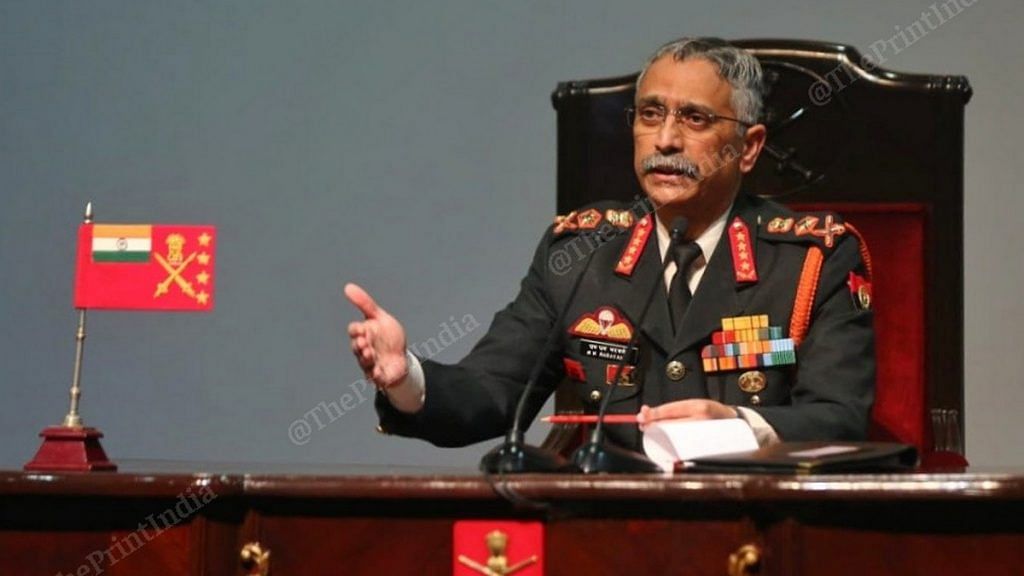Army chief M.M. Naravane’s insinuation that Kathmandu was protesting over the boundary issue on the behest of another country is insensitive, uncalled for, and deeply damaging for the two armies in which he holds the rank of General, India and Nepal. As honorary General of the Nepal Army, Naravane has undermined his own position, waded into a domain that is clearly non-military, and brought unnecessary stress on a relationship unique to the two armies. Especially because the seven Gorkha regiments in the Indian Army make up almost 40 battalions, and most of the soldiers are recruited from Nepal.
In speaking out of turn, Gen Naravane followed the unfortunate precedent that has been encouraged to flourish in the recent past — voluble military chiefs doubling as spokespersons.
India and Nepal not only have the most cordial and interwoven societal relations among sovereign countries, but also the deepest military relationship possible. No two armies are as closely interlinked as those of India and Nepal, and this incomparable time-tested bond has been placed under a strain by an utterance that is both avoidable and unmilitary.
Speaking at an online seminar organised by the Manohar Parrikar Institute for Defence Studies Analyses on 15 May 2020, Gen Naravane said, “I don’t know what they are actually agitating about. There has never been any problem in this Corps in the past. There is a reason to believe that they might have raised this problem at the behest of someone else and that is very much a possibility.”
Forgetting Cariappa’s guidebook
The reciprocal appointment of Generals in both armies began with late Field Marshal (then Gen) K.M. Cariappa, when he assumed office as Chief of Army Staff (COAS) in 1950. The Royal Nepal Army conferred the honorary rank of General on him, and since then it has been followed as a gesture of respect and honour seldom seen between two sovereign armies. As COAS, Field Marshal Cariappa penned the last word on what is expected of an officer with his handbook on etiquette for gentleman cadets. It seems to have been misplaced, since this is possibly the first occasion when an Army chief has raised doubts about the political and diplomatic actions of Nepal.
It brings to mind one of the oft-repeated quotes of the inimitable, and legendary, Field Marshal Sam Manekshaw. He joined 8 Gorkha Rifles after India was partitioned and his original Frontier Force battalion became part of the Pakistan Army. Sam Bahadur, as he came to be fondly called, left behind a treasure trove of quotes relevant for the nation and its Army. As a Gorkha, he would have been particularly dismayed by the current controversy as is clear from his very prescient observation: “The problem in India is that as soon as one of us is put in a position of power, he feels that he has the monopoly of the entire knowledge.”
Citizens of Nepal train and then take an oath to uphold the national security interests of India. And over the decades they have been living up to that oath, many times making the ultimate sacrifice. Army’s seven Gorkha regiments depict a closeness and confidence unparalleled today. The numbers drawing an Indian Army pension in Nepal is slowly nudging toward 130,000. So much so that Army officers posted in the Indian embassy in Nepal would be the highest number in a diplomatic mission, and include military medical staff, which is an apt testimony to the importance given to Nepali Gorkha soldiers and their families.
Also read: Nepal map row: Has India provoked Kathmandu or is China instigating trouble for New Delhi?
Indignation brought by an Army chief
Gen. Naravane has undermined the credibility of Nepal, which has given so much to India in terms of soldiers, service, and many a times sacrifices, too. Indians with deep-rooted family connections in Nepal see yet another needless controversy between the two countries. Even as the ire over the Madhesi agitation persists in Kathmandu and beyond, India’s meddlesome attitude toward Nepal is once again a point of heated discussion there.
Except this time, a first ever, the indignation is because of an Army officer, and a chief at that. No soldier, in India or in Nepal, believes that General Naravane’s inconsiderate remarks have not been instigated by someone within the Narendra Modi government.
That is indeed a harsh whisper to circulate, which once again brings to mind another gem from late Sam Bahadur when former Prime Minister Indira Gandhi asked him about military coup rumours. Mutual respect was of a different order then, and he quipped, “You mind your own business, I’ll mind mine. You kiss your own sweetheart, I’ll kiss mine. I don’t interfere politically, as long as nobody interferes with me in the Army.” Sam Bahadur would obviously dissect this episode very differently.
The author is a Congress leader and Editor-in-Chief of Defence & Security Alert. Views are personal.
